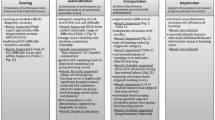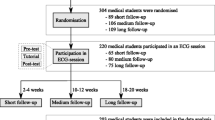Abstract
Purpose. To examine the effect of instructional format on medical students' learning of ECG diagnosis. Method. Two experiments employed different learning and practice methods. In the first, students were randomly allocated to one of two instructional approaches, one organized around features (e.g., QRS voltage) and the other around diagnostic categories (e.g., bundle branch blocks), followed by a practice phase. In the second experiment, the instruction was standardized, and students were randomly allocated to one of two practice phases, either “contrastive” where examples from various categories are mixed together, or “non-contrastive” where all the examples in a single category are practiced in a single block.Results. In the first experiment, there was no significant differences in students' diagnostic accuracy on novel ECG examples. In the second experiment, students exposed to the contrastive approach in the practice phase had superior diagnostic accuracy (46%) compared to 30% accuracy for the non-contrastive session, p < 0.05).Conclusion. These experiments highlight two important features in the design of instructional materials. First, learning around the features of the problem (analogous to problem – based learning) may have no advantages over learning the category. Second, the design and organization of deliberate practice can result in significant learning gain.
Similar content being viewed by others
References
Albanese, M.A. & Mitchell, S. (1993). Problem based learning: A review of literature on its outcome and implementation issues. Academic Medicine 68: 52–81.
Avrahami, J., Kareev, Y. et al. (1997). Teaching by examples: implications for the process of category acquisition. Quarterly Journal of Experimental Psychology 50A: 586–606.
Bransford, J.D., Brown, A.L. & Cocking, R.R. (1999). How People Learn: Brain, Mind, Experience and School. Washington, DC: National Academy Press.
Colliver, J. (2000). Effectiveness of problem based learning curricula: Theory and practice. Academic Medicine 75: 259–266.
Ericsson, K.A. & Charness, N. (1994). Expert performance: Its structure and acquisition. American Psychologist 49: 725–747.
Fincher, R., Abdulla, A. et al. (1988). Computer-assisted learning compared with weekly seminars for teaching fundamental electrocardiography to junior medical students. Southern Medical Journal 81: 1291–1294.
Gick,M.L.& Holyoak, K.J. (1980). Analogical problem solving. Cognitive Psychology 12: 306–355.
Guest, C.B, Regehr, G. & Tiberius, R.G. (2001). The life long challenge of expertise. MedicalEducation 35: 78–81.
Kingston, M. (1979). Electrocardiograph course. Journal of Medical Education 54: 107–110.
Klayman, J. & Brown, K. (1993). Debias the environment instead of the judge: An alternative approach to reducing error in diagnostic (and other) judgment tasks. Cognition 49: 97–122.
McKenzie, C.R.M. (1998). Taking into account the strength of an alternative. Journal of Experimental Psychology: Learning, Memory & Cognition 24: 771–792.
Needham, D.R. & Begg, I.M. (1991). Problem-oriented training promotes spontaneous analogical transfer: memory-oriented training promotes memory for training. Memory and Cognition 19: 543–557.
Norman, G.R. & Schmidt, H.G. (1992). The psychological basis of problem based learning.Academic Medicine 67: 557–565.
Norman G.R. & Schmidt, H.G. (2000). Effectiveness of problem based learning curricula: Theory, practice and paper darts. Medical Education 34: 721–728.
Stretton, T., Hall, R. & Owen, S.G. (1967). Programmed instruction in medical education. British Journal of Medical Education 1: 165–168.
Ten Cate, O. (2001). Whatever happened to the student? Advances in Health Sciences Education 6:81–88.
Underwood, D.A. (1993). Clinical Electrocardiography: Self-assessment and Review. Pennsylvania, PA: W.B. Saunders Company.
Vernon, D.T.A. & Blake, R,L. (1993). Does problem based learning work? A meta-analysis of evaluative research. Academic Medicine 68: 550–563.
Walton, H.J. & Matthews, M.B. (1989). Essentials of problem based learning. Medical Education 23: 542–558.
Author information
Authors and Affiliations
Corresponding author
Rights and permissions
About this article
Cite this article
Hatala, R.M., Brooks, L.R. & Norman, G.R. Practice Makes Perfect: The Critical Role of Mixed Practice in the Acquisition of ECG Interpretation Skills. Adv Health Sci Educ Theory Pract 8, 17–26 (2003). https://doi.org/10.1023/A:1022687404380
Issue Date:
DOI: https://doi.org/10.1023/A:1022687404380




